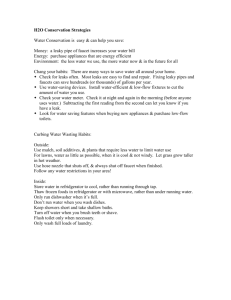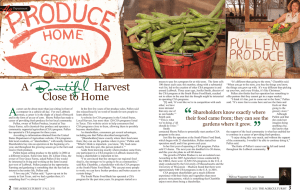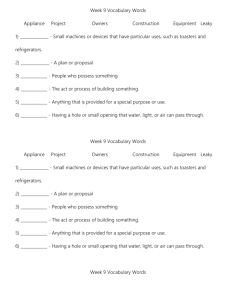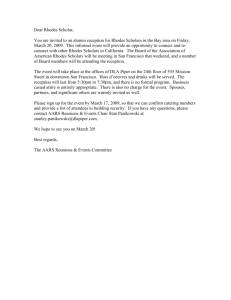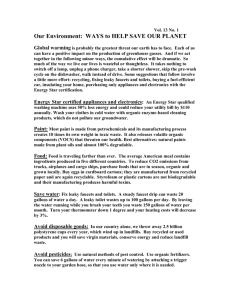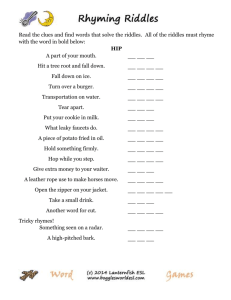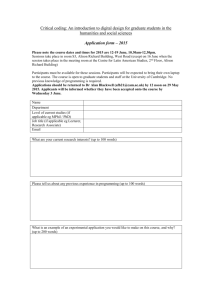Workshop Description - Faculty of Business and Economics
advertisement
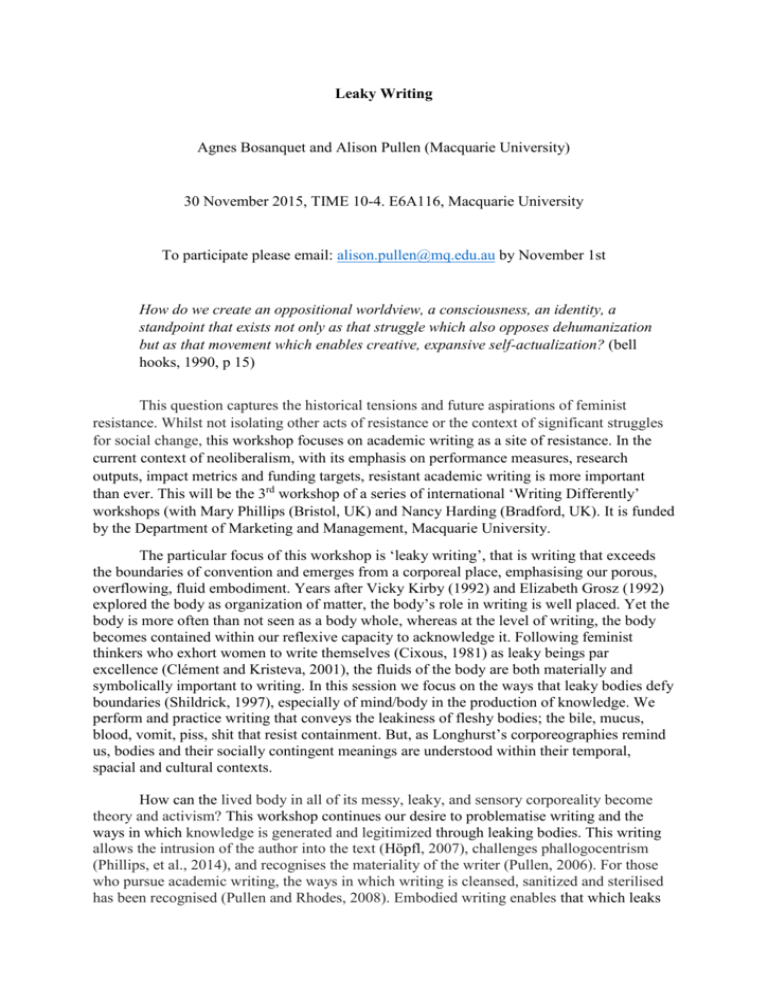
Leaky Writing Agnes Bosanquet and Alison Pullen (Macquarie University) 30 November 2015, TIME 10-4. E6A116, Macquarie University To participate please email: alison.pullen@mq.edu.au by November 1st How do we create an oppositional worldview, a consciousness, an identity, a standpoint that exists not only as that struggle which also opposes dehumanization but as that movement which enables creative, expansive self-actualization? (bell hooks, 1990, p 15) This question captures the historical tensions and future aspirations of feminist resistance. Whilst not isolating other acts of resistance or the context of significant struggles for social change, this workshop focuses on academic writing as a site of resistance. In the current context of neoliberalism, with its emphasis on performance measures, research outputs, impact metrics and funding targets, resistant academic writing is more important than ever. This will be the 3rd workshop of a series of international ‘Writing Differently’ workshops (with Mary Phillips (Bristol, UK) and Nancy Harding (Bradford, UK). It is funded by the Department of Marketing and Management, Macquarie University. The particular focus of this workshop is ‘leaky writing’, that is writing that exceeds the boundaries of convention and emerges from a corporeal place, emphasising our porous, overflowing, fluid embodiment. Years after Vicky Kirby (1992) and Elizabeth Grosz (1992) explored the body as organization of matter, the body’s role in writing is well placed. Yet the body is more often than not seen as a body whole, whereas at the level of writing, the body becomes contained within our reflexive capacity to acknowledge it. Following feminist thinkers who exhort women to write themselves (Cixous, 1981) as leaky beings par excellence (Clément and Kristeva, 2001), the fluids of the body are both materially and symbolically important to writing. In this session we focus on the ways that leaky bodies defy boundaries (Shildrick, 1997), especially of mind/body in the production of knowledge. We perform and practice writing that conveys the leakiness of fleshy bodies; the bile, mucus, blood, vomit, piss, shit that resist containment. But, as Longhurst’s corporeographies remind us, bodies and their socially contingent meanings are understood within their temporal, spacial and cultural contexts. How can the lived body in all of its messy, leaky, and sensory corporeality become theory and activism? This workshop continues our desire to problematise writing and the ways in which knowledge is generated and legitimized through leaking bodies. This writing allows the intrusion of the author into the text (Höpfl, 2007), challenges phallogocentrism (Phillips, et al., 2014), and recognises the materiality of the writer (Pullen, 2006). For those who pursue academic writing, the ways in which writing is cleansed, sanitized and sterilised has been recognised (Pullen and Rhodes, 2008). Embodied writing enables that which leaks to saturate our writing and knowledge production. Experimental writing that breaches the norms of academia makes trouble for power regimes (Sayers and Jones, 2015). This is writing as activism (Vachhani, 2015). How can writing and the bodies that write become mutually recalcitrant? What is such writing capable of? How can leaky writing challenge the institutions that render us compliant to the academic conventions that stifle creativity? Order of the session 10.30 Writing, leaking – to resist Alison Pullen 10.45 Mucus Agnes Bosanquet 11.15 Inside/Outside Elaine Swan 11.45 ‘In deference to some professor with a measuring-rod up his sleeve’: Virginia Woolf and writing ‘what you wish to write’. Deborah Jones 12.15 Bottoms up! Luc Peters 12.45 Lunch 1.45 Feeling ficto-criticism Carl Rhodes 2.15 Dog writing Janet Sayers 2.45 Writing: parts, collectives 3.45 Wrap up Agnes and Alison 5pm ACSCOS Smoking Ceremony and Welcome drinks. References Cixous, H. (1981). The laugh of the Medusa. K. Cohen and P. Cohen (Trans.). In E. Marks and I. de Courtivron (Eds.), New French feminisms: An anthology (pp 245-264). New York: Pantheon Books. Clément, C., and Kristeva, J. (2001). The feminine and the sacred. J. M. Todd (Trans.). New York: Columbia University Press. hooks, b. (1990). Yearning: Race, gender and cultural politics. Boston: South End Press. Höpfl, H. (2007). The codex, the codicil and the codpiece: Some thoughts on diminution and elaboration in identity formation. Gender, Work & Organization, 14(6), 619-632. Longhurst, R. (2001). Bodies: Exploring fluid boundaries (Vol. 11). Psychology Press. Pullen, A., & Rhodes, C. (2008). Dirty writing. Culture and Organization, 14(3), 241-259. Pullen, A., & Rhodes, C. (2015). Writing, the Feminine and Organization. Gender, Work & Organization, 22(2), 87-93. Phillips, M., Pullen, A., & Rhodes, C. (2014). Writing organization as gendered practice: Interrupting the libidinal economy. Organization Studies, 35(3), 313-333. Sayers, J. G., & Jones, D. (2015). Truth Scribbled in Blood: Women's Work, Menstruation and Poetry. Gender, Work & Organization, 22(2), 94-111. Shildrick, M. (1997). Leaky bodies and boundaries: Feminism, postmodernism and (bio) ethics. Psychology Press.

